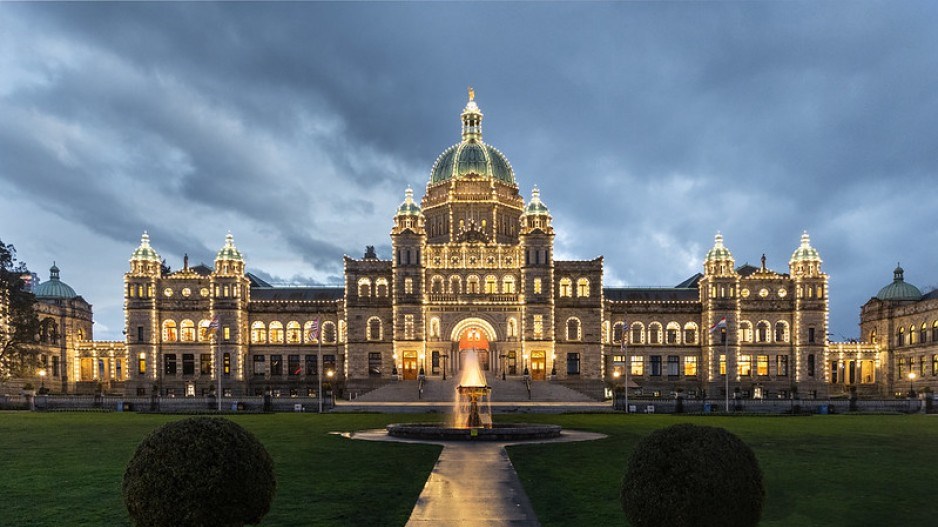If you were hoping to spend your shiny new $1,000 “Eby-bate” during the holidays, maybe to load up on Christmas presents for the kids, or top-shelf booze to survive the festive season with the in-laws: You are out of luck. The money won’t be flowing for another four months, at the earliest.
Premier David Eby made the admission Wednesday, outside the first meeting of his newly appointed cabinet in Victoria.
“In terms of the middle-class tax cut, ensuring that we're delivering that for families, that's a priority for me,” said Eby. “We promised British Columbians we would deliver that. We will deliver it.”
Just, not right away.
“Because it takes some time with the federal government to implement the tax cut, we will have to pass legislation so that we're able to provide that grocery rebate to people earlier,” said Eby.
The rebates likely won’t appear until March or April.
Behind the scenes, New Democrats had been trying to figure out a way to get the rebates out the door as quickly as possible, following the Oct. 19 provincial election in which the party promised the cheques.
But it turns out, governments aren’t allowed to use cabinet orders to spend $1.8 billion in rebates. That kind of spending requires a supply bill, approved by legislators in the people’s house.
The premier could have recalled the legislature immediately to pass the enabling legislation and authorize the rebate cheques. However, last week, NDP house leader Mike Farnworth advised Eby to forgo a fall session and wait until February.
Part of the issue is the government still hasn’t figured out how to actually disperse the funds. What financial vehicle could be used to determine people’s incomes (the $500 cheque for individuals phases out at $125,000, and the $1,000 household cheque at $250,000)? Where is there a list of direct deposits for bank accounts or addresses to mail paper cheques? How can the government prevent against fraud or missing money?
Officials in the Ministry of Finance are doing that work behind the scenes. Meanwhile, the calendar ticks by on grumpy voters who expressed displeasure in the election at the lack of help during the cost of living crisis.
The Opposition Conservatives pounced on the delay.
“People that need help NOW will have to wait until late 2025 for his $1,000 election vote buy promise since he won’t call Legislature back to work before Feb. 18,” said Opposition Conservative critic Peter Milobar on social media.
It’s hard to match the leisurely pace of the legislative session with what Eby and his ministers have been saying publicly the last couple of weeks, which is that they’ve heard loud and clear the public frustration on affordability and are looking to get down to work immediately on delivering election promises.
The messaging conveyed a sense of urgency. But the actions don’t quite match that up.
Eby also on Wednesday passed on another move he could have made to provide immediate financial relief to British Columbians, by rejecting calls to exempt from the Provincial Sales Tax all the items Ottawa is exempting for two months from the federal GST, starting Dec. 14.
While B.C. does already exempt many purchases from the PST, the seven per cent tax will remain in place on things like children’s toys, video games and alcohol (where the PST is 10 per cent) during the holidays.
That, despite calls from the federal finance minister for premiers to “step up” and match the GST cuts, and a decision by Ontario on Wednesday to exempt items from the PST.
“I will admit, I am frustrated to hear another announcement from Ottawa about federal spending that disproportionately benefits other provinces,” said Eby.
“They will give significantly more money per person in provinces that have the HST compared with British Columbia.”
True. Provinces with the HST get a better deal. But B.C. could also choose to provide the PST savings now, and fight for the federal reimbursement later, if it wanted.
Doing so would have given British Columbians a little relief during the holidays. Which is what they want — regardless of the political excuses.
Rob Shaw has spent more than 16 years covering B.C. politics, now reporting for CHEK News and writing for Glacier Media. He is the co-author of the national bestselling book A Matter of Confidence, host of the weekly podcast Political Capital, and a regular guest on CBC Radio.



